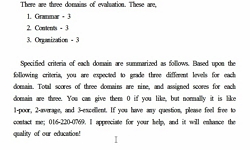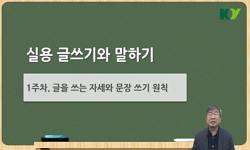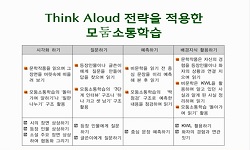본고는 논증적 글쓰기 평가에서 통일성 채점 기준 세 가지를 제시하고 분석하였다. 이를 위하여 선행 연구를 검토하여 통일성 개념과 평가 요소를 논의하고 이를 바탕으로 설계한 내용 중심...
http://chineseinput.net/에서 pinyin(병음)방식으로 중국어를 변환할 수 있습니다.
변환된 중국어를 복사하여 사용하시면 됩니다.
- 中文 을 입력하시려면 zhongwen을 입력하시고 space를누르시면됩니다.
- 北京 을 입력하시려면 beijing을 입력하시고 space를 누르시면 됩니다.

논증적 글쓰기 평가에서의 텍스트 영역 고찰 (II) - 통일성을 중심으로 = Exploring Textual Features in Assessing Argumentative Writing II - A Focus on Coherence
한글로보기https://www.riss.kr/link?id=A109627909
- 저자
- 발행기관
- 학술지명
- 권호사항
-
발행연도
2025
-
작성언어
Korean
- 주제어
-
등재정보
KCI등재
-
자료형태
학술저널
-
수록면
7-41(35쪽)
- DOI식별코드
- 제공처
-
0
상세조회 -
0
다운로드
부가정보
국문 초록 (Abstract)
이 연구는 내용 중심 통일성 채점 기준이 논증적 글쓰기 평가의 신뢰도를 높이는 데 효과적이며, 교육 현장에서 실질적인 쓰기 지도 및 평가 도구로 활용하기 위한 가능성을 확인하였다. 또한 쓰기 평가에서 채점 기준의 명확성 및 해석 일관성이 신뢰도 확보의 핵심 요소임을 확인하였으며, 이를 위해 체계적인 채점 지침 개발, 채점자 맞춤형 훈련 과정 운영, 정기적 신뢰도 검토가 필요함을 제언하였다.
이러한 경험 연구를 바탕으로 본 연구에서는 다양한 문종과 다른 학습자 수준을 고려한 통합적 쓰기 평가 체계 개발의 필요성을 제시하였다. 본 연구는 쓰기 평가의 신뢰도와 타당성을 높이고, 학습자의 쓰기 역량을 증진하기 위한 실질적 기반을 제공한다는 의의가 있다.
본고는 논증적 글쓰기 평가에서 통일성 채점 기준 세 가지를 제시하고 분석하였다. 이를 위하여 선행 연구를 검토하여 통일성 개념과 평가 요소를 논의하고 이를 바탕으로 설계한 내용 중심, 과 응집성의 정의 및 관계, 평가 요소 등을 분석하고 이를 바탕으로 내용 중심 통일성, 논리적 흐름 중심 통일성, 형식적 연결 중심 통일성 채점 기준을 도출하였다. 이를 대학교 1학년 학습자의 논증적 글쓰기 표본 100편에 적용하여 분석하였다.
이 연구는 내용 중심 통일성 채점 기준이 논증적 글쓰기 평가의 신뢰도를 높이는 데 효과적이며, 교육 현장에서 실질적인 쓰기 지도 및 평가 도구로 활용하기 위한 가능성을 확인하였다. 또한 쓰기 평가에서 채점 기준의 명확성 및 해석 일관성이 신뢰도 확보의 핵심 요소임을 확인하였으며, 이를 위해 체계적인 채점 지침 개발, 채점자 맞춤형 훈련 과정 운영, 정기적 신뢰도 검토가 필요함을 제언하였다.
이러한 경험 연구를 바탕으로 본 연구에서는 다양한 문종과 다른 학습자 수준을 고려한 통합적 쓰기 평가 체계 개발의 필요성을 제시하였다. 본 연구는 쓰기 평가의 신뢰도와 타당성을 높이고, 학습자의 쓰기 역량을 증진하기 위한 실질적 기반을 제공한다는 의의가 있다.
다국어 초록 (Multilingual Abstract)
The findings reveal that the content-centered coherence scoring criteria demonstrate a high degree of reliability, highlighting their effectiveness as a practical tool for both writing instruction and assessment. Furthermore, this study underscores the importance of clear scoring criteria and consistent interpretation to ensure the reliability of writing assessments. To address these factors, the present study recommends developing systematic scoring guidelines, implementing tailored scorer training programs, and regularly evaluating scoring reliability.
These findings emphasize the need for an integrated writing assessment framework that considers different writing genres and learner proficiency levels. Ultimately, this research contributes to a robust foundation for enhancing the reliability and validity of writing assessments while supporting the development of learners' writing competence across diverse educational settings.
This study examines three coherence scoring criteria for assessing argumentative writing. To this end, a comprehensive review of existing research explored the concept of coherence, its evaluative dimensions, and their interrelationships. This analysi...
This study examines three coherence scoring criteria for assessing argumentative writing. To this end, a comprehensive review of existing research explored the concept of coherence, its evaluative dimensions, and their interrelationships. This analysis led to the development of three distinct scoring criteria: content-centered, logical-flow-centered, and formal-connection-centered coherence. These criteria were applied to 100 argumentative writing samples from first-year university students and systematically analyzed.
The findings reveal that the content-centered coherence scoring criteria demonstrate a high degree of reliability, highlighting their effectiveness as a practical tool for both writing instruction and assessment. Furthermore, this study underscores the importance of clear scoring criteria and consistent interpretation to ensure the reliability of writing assessments. To address these factors, the present study recommends developing systematic scoring guidelines, implementing tailored scorer training programs, and regularly evaluating scoring reliability.
These findings emphasize the need for an integrated writing assessment framework that considers different writing genres and learner proficiency levels. Ultimately, this research contributes to a robust foundation for enhancing the reliability and validity of writing assessments while supporting the development of learners' writing competence across diverse educational settings.
동일학술지(권/호) 다른 논문
-
- 한국작문학회
- 이재기
- 2025
- KCI등재
-
유아 및 초등학생의 문해 학습에서 쓰기 도구의 효과에 대한 체계적 고찰
- 한국작문학회
- 변경가
- 2025
- KCI등재
-
생성형 인공지능 활용 글쓰기에 대한 예비교사의 인식 - 근거 이론에 의한 탐구
- 한국작문학회
- 김혜연
- 2025
- KCI등재
-
- 한국작문학회
- 최진영
- 2025
- KCI등재




 KCI
KCI KISS
KISS






